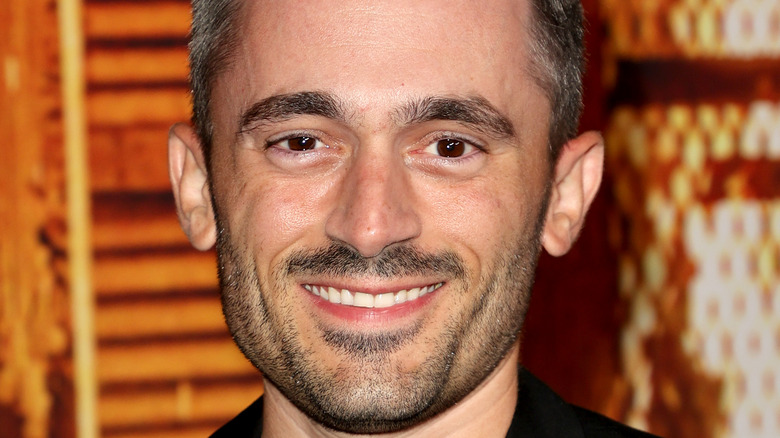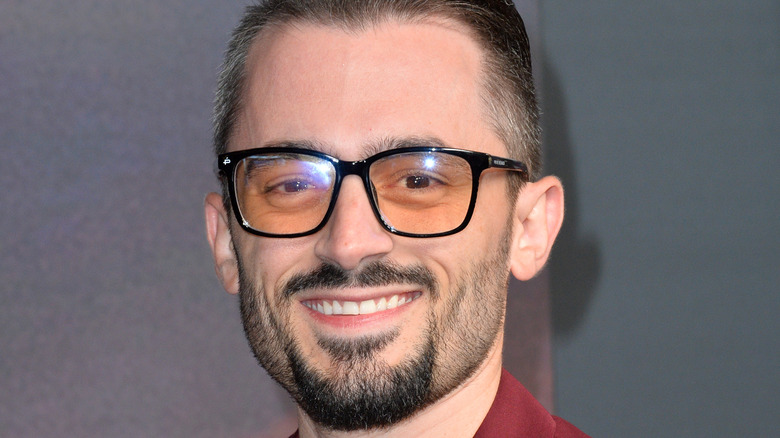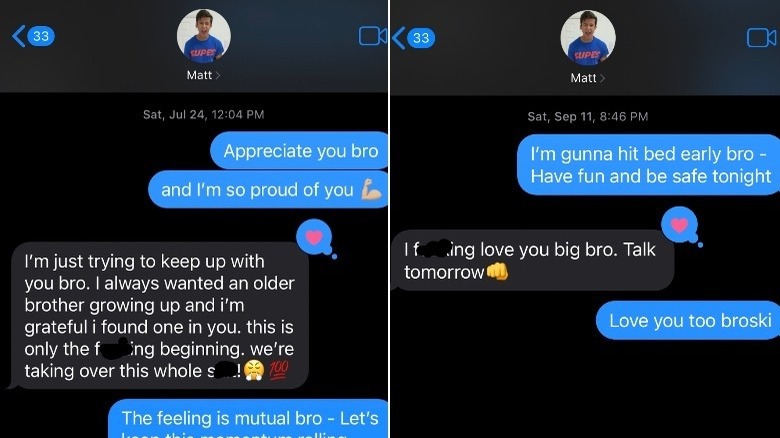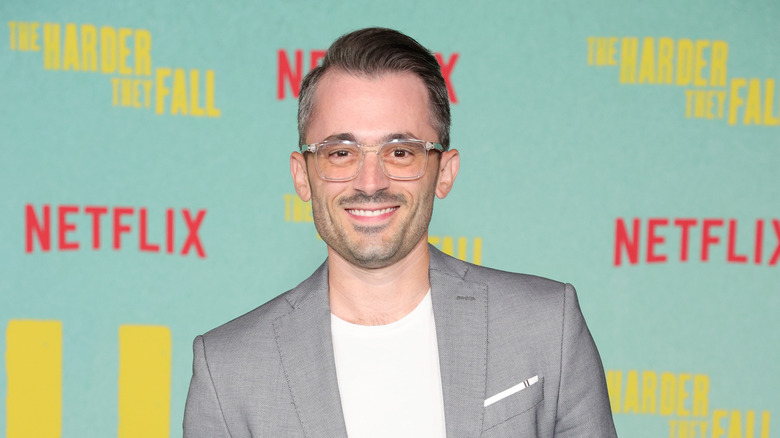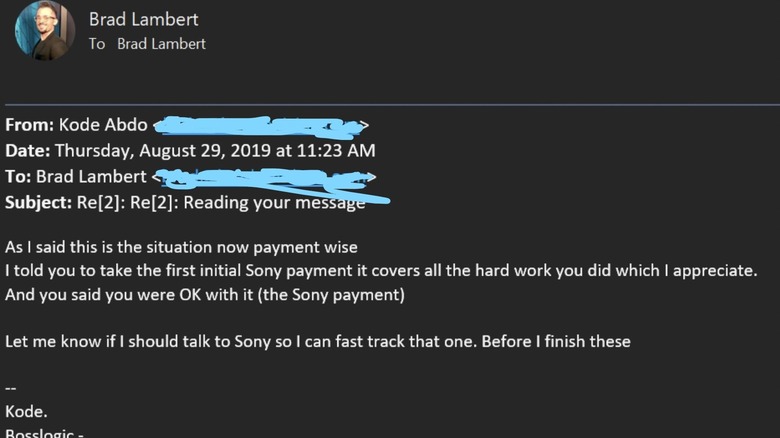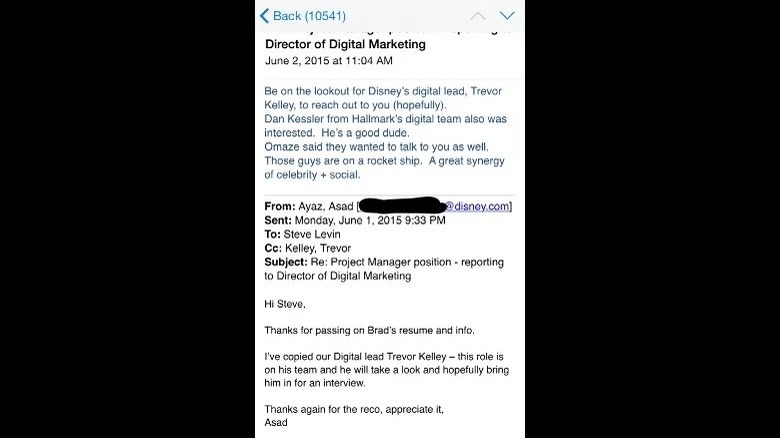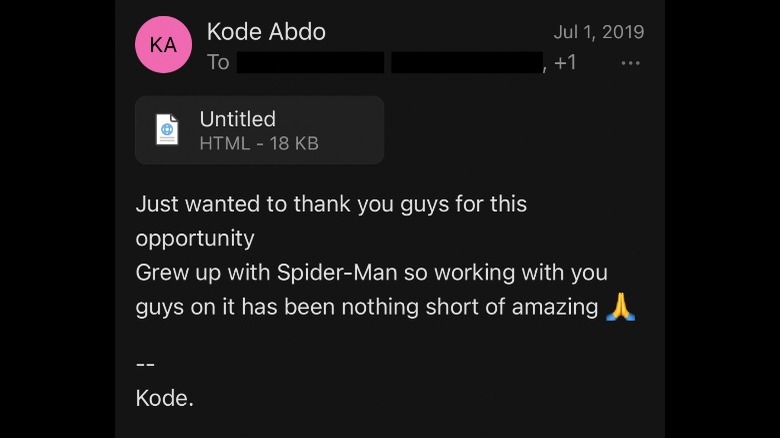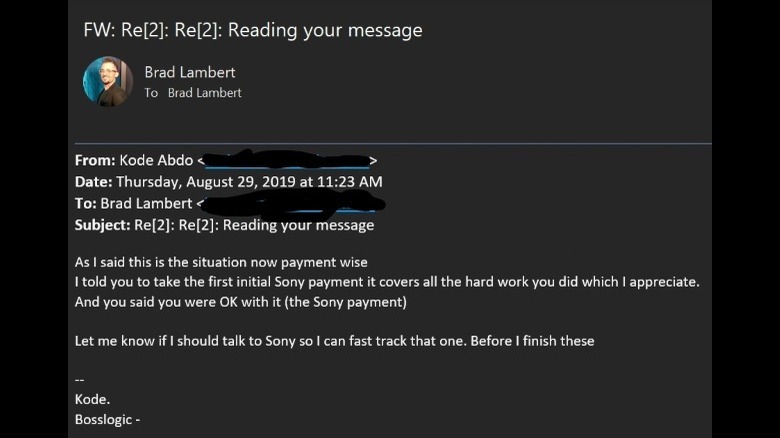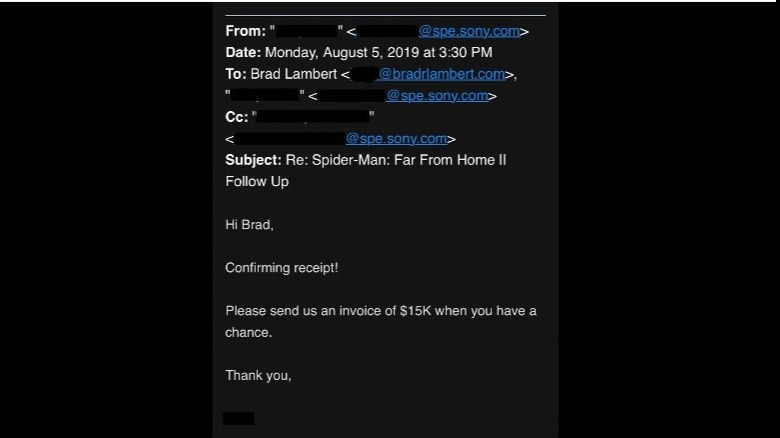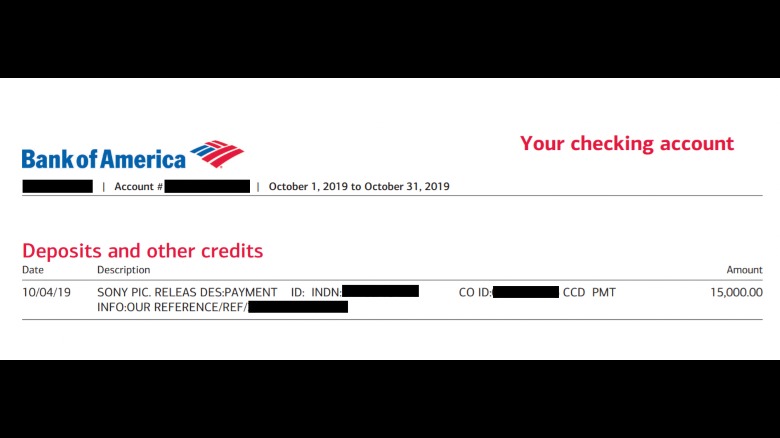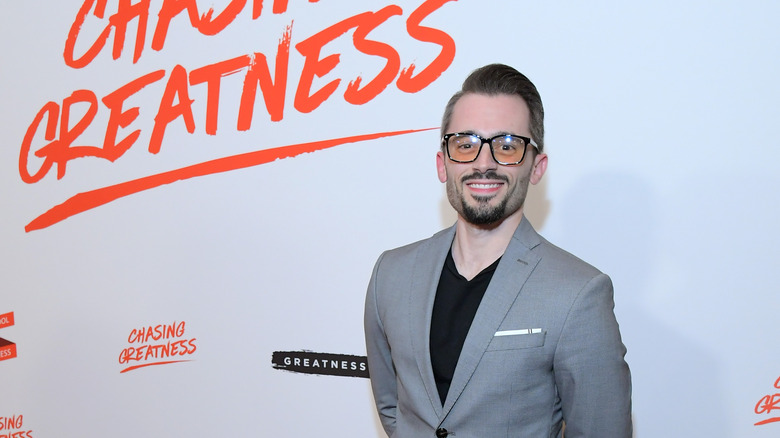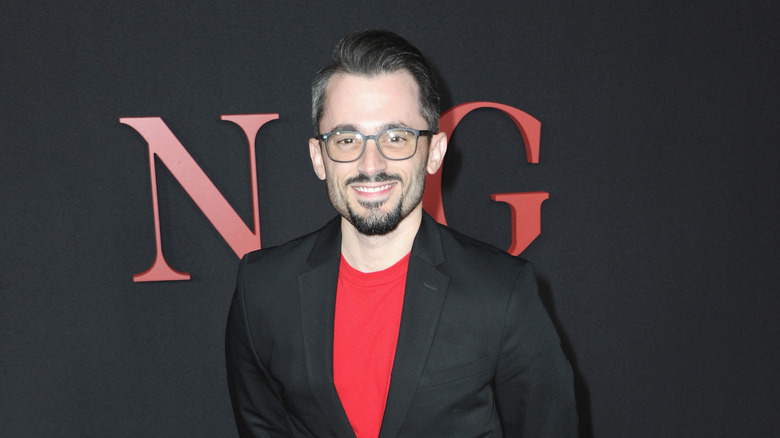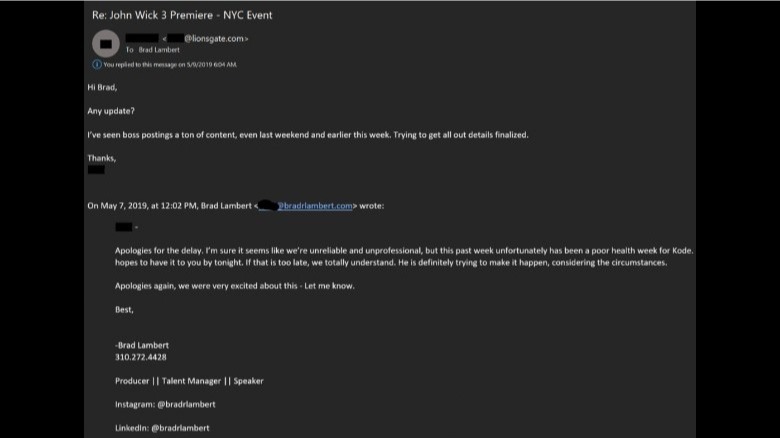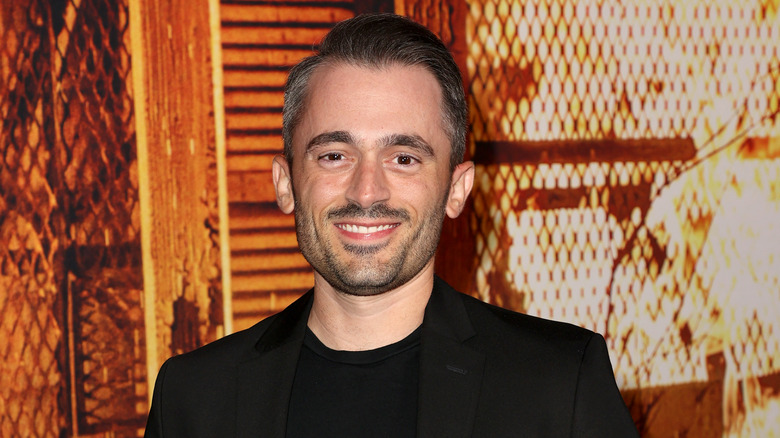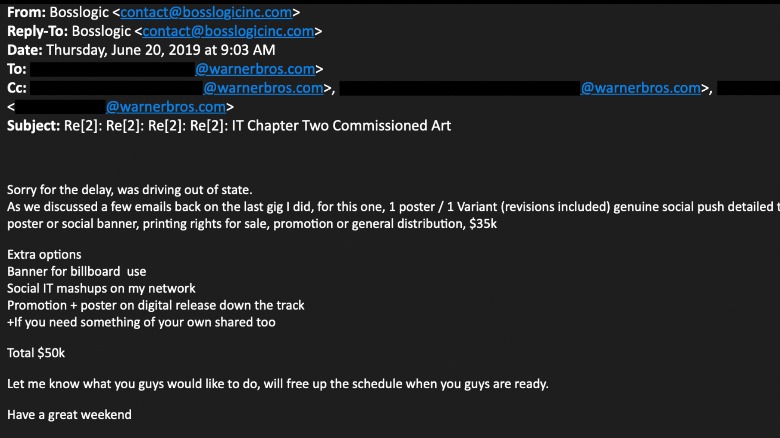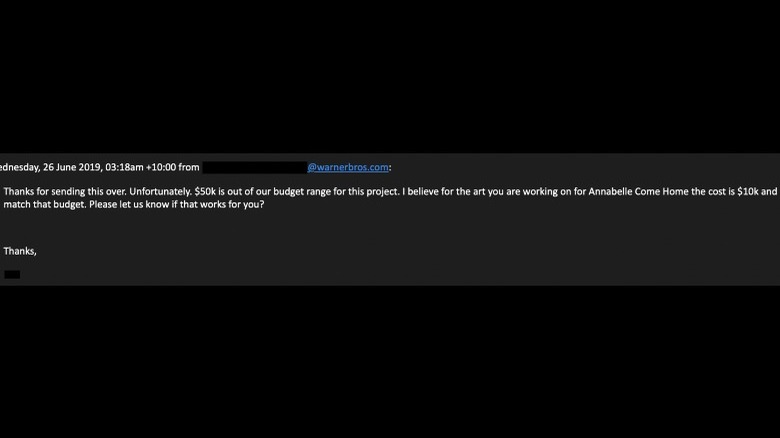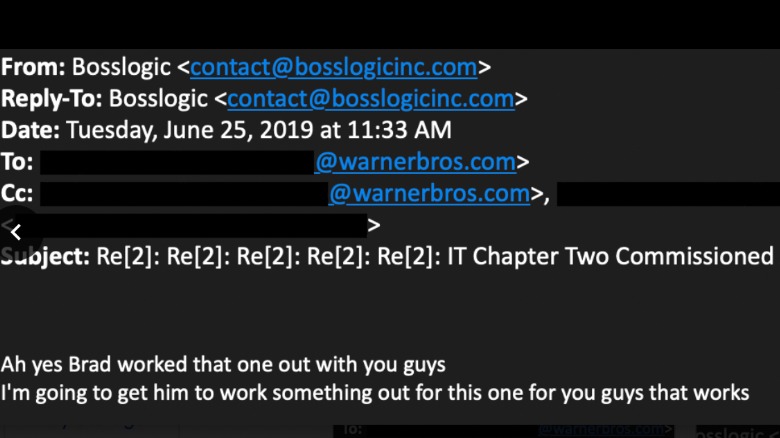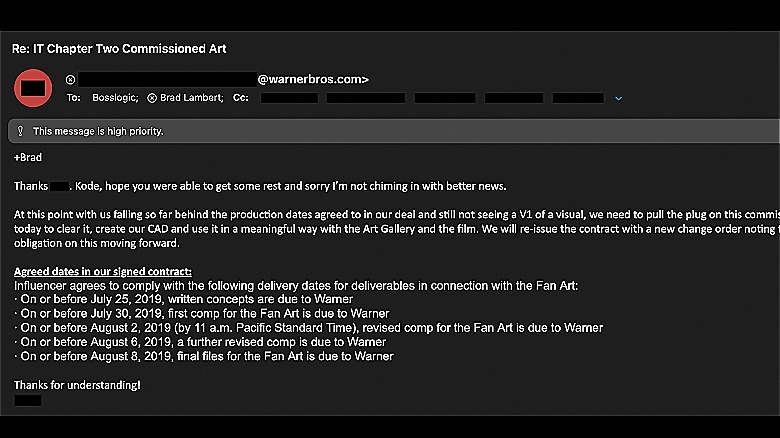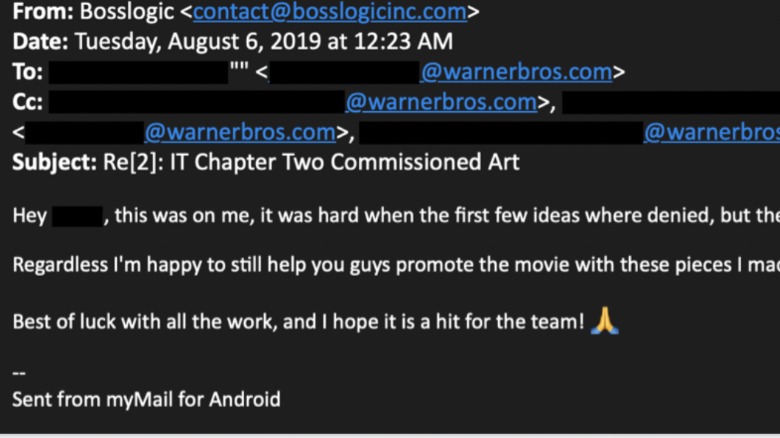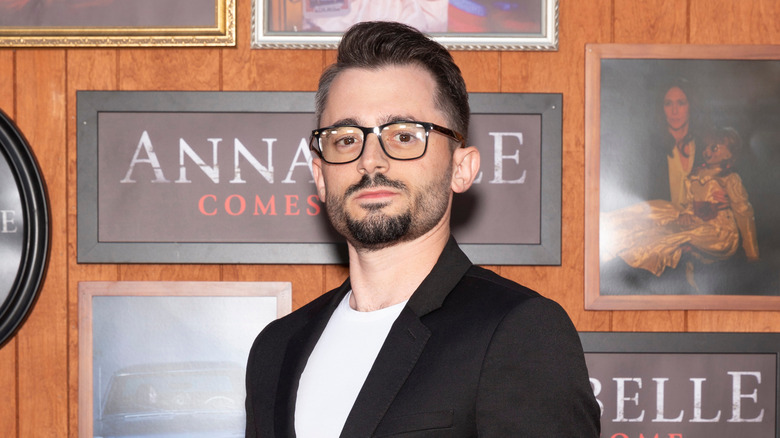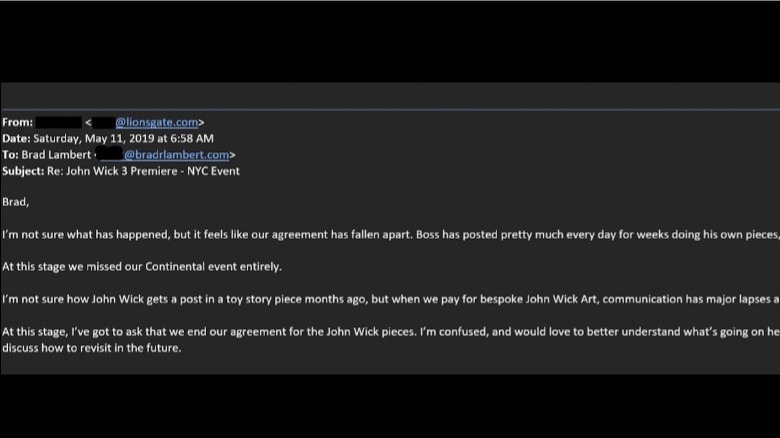Brad Lambert Counters Claims From Matt Ramos, BossLogic, And Others Published By TheWrap - Part One - Exclusive Interview
The relationships between managers and their Hollywood clients are as fraught now as the days of old Hollywood, but the landscape looks incredibly different. With the introduction of social media, the new generation of TikTok stars, and the newcomers welcomed into the industry every day, the role of a manager has become increasingly complex — especially when you add layered elements of disgruntled clients to the mix.
Brad Lambert is one such manager who has been in and around the management scene for years, originally working in the sports landscape before moving to Los Angeles to help entertainment dreams become realities. Working with social media stars and artists — all looking to get ahead and make their mark in the media world — Brad's connections and tenacity helped those aspirations come to fruition, until it all came crashing down.
In February of this year, Hollywood publication TheWrap published an expository article about the manager, placing Brad at the epicenter of very serious claims. Former clients, including artist BossLogic and social media influencer Matt Ramos, alleged that Brad ruined thousand-dollar deals with studios, used them for clout, embarrassed them in front of top brass, and took advantage of their platforms, among a litany of other assertions. While TheWrap did reach out to Brad for comment, the manager is adamant that evidence he provided — screenshots of emails, texts, DMs, etc. — were not used to back up his side of the story, and maintains that the article moved forward without any evidence from his former clients.
Having provided a copious amount of correspondence, Brad sat down with us for his first interview since the article from TheWrap was released, expressing his distress over the allegations lodged against him and the impact the piece has had on his career.
Brad recalls when TheWrap initially reached out to him
Before we get into the details, give me some background as to how that piece, from your perspective, came about. When were you contacted about it? What were those initial lines of communication like?
Specifically for TheWrap, [writer] Umberto Gonzalez reached out to me, I want to say around the second week of January. I can get you this specific date on the first email that he sent. It was a phone call and then a follow-up email right away. When I saw it come in, I've spoken to Umberto probably twice in my life, and that was the extent of our relationship. I know he covers all the films and TV occasionally from a coverage standpoint. He writes reviews. He covers scoops. He calls himself an "ace scooper," and he does a great job on that. He's a film reporter with TheWrap. When I saw the email come in, that was a red flag for me. I was like, "Oh boy." Now, mind you, I had sent cease and desists to both Matt Ramos and Taya Miller around the holidays in December, which was not detailed in the article whatsoever.
And that cease and desist, which was sent from my attorneys, outlined the fact that they were sending emails to brands and studios from the time Matt and his friends cut me off, which was around the 8th to 10th of November. I can get you specific dates on that, but literally, it was a span of three days and then [it was] done. There was no communication. Nobody said anything, no text, no emails, no nothing. They all ghosted me simultaneously, which was fine.
I was heartbroken because Matt Ramos truly was like a little brother I never had. I loved that kid. I did everything I could to help him, to elevate him both personally and professionally. We didn't even have a managerial contract, which was also not displayed in the article. They tried very hard to label and paint me as a "suit" in Los Angeles that takes advantage of young kids.
Brad shares his perspective on the initial article's characterization of his client relationships
Ed. Note: Images have been slightly edited to censor profanity.
[On his relationship with clients, specifically Matt Ramos]
It was a very desperate narrative that [TheWrap] were trying to make, but when there are no lemons to make lemonade, you have to get creative. [Matt and I] were friends first. That was it. I didn't have a contract, and if there's no contract that happened or exists, I can't technically be your manager. If Matt or Taya ever were unhappy with the assistance that I was giving them, which ranged from a variety of different things which we'll get into, they could have walked away at any given moment. There would be nothing that I could do about it because I didn't have a contract with them. I didn't want to have a contract with them because we were friends. I didn't want to force a piece of paper. I put myself at a disadvantage because I was like, "Yeah, they could screw me over, but my word is truth, and I have integrity."
I believe in these kids and these people, and I want to help them. I hope that they will compensate me for my 15%, on these finders fees — a management fee for all of the work that I did for them, which I worked with Matt for. I've known him for almost a year and a half, two years, and I worked with him every single day. It was nonstop. Let me tell you, from a manager standpoint, I made like $1200 as a "manager" from Matt. The narrative that I was "using him" to get "rich and famous" ... $1200 isn't even my half of the rent in Los Angeles for the year that we were working. Mind you, I was not compensated for my time and effort that I put in on the three remaining campaigns that I did at the end of the year, which amounted to around $3,000, which I never saw. He can keep it, but it's the point.
The manager maintains that he had nothing to hide from TheWrap and the publication's initial inquiries
[On the initial inquiries from TheWrap]
When Umberto reached out, I called him because I was like, "I have nothing to hide. I'm going to call this guy." The second the phone conversation began, I knew I was in trouble. He was loud. He was aggressive. He was pushy. He was very much painting a narrative right out of the gate, trying to insinuate certain things and twist words. I was entertaining his questions and trying to tell him that ... My first question to him right out of the gate was, "Why is this on your desk?" I was like, "You're a film reporter with TheWrap. Why are you inquiring, investigating about influencer drama?"
What was his response to that?
He panicked because I called him out on it, I saw through this right away. And I was like, "Why?" I was like, "I'm not big, and I'm not the caliber of the people that you generally cover. Leslie Grace and 'Batgirl,' all these big celebrities and these big projects and rightfully so. I am not that person. I am not at that level. I hope one day maybe, but I'm very much still on my way." I said that. I'm like, "I'm not big. This isn't important. This is just a squabble."
It wasn't his wheelhouse?
No, not at all, and I said that. He's like, "Well, I have five former clients that say otherwise." When he said that, that right out of the gate was an incorrect statement and/or lie because five former clients would insinuate that I had contracts with each one of those people and/or worked with each one of those people. I had contracts with only one person and that was BossLogic, which was three years ago. I haven't talked to him in three years.
Brad explains why his relationship artist BossLogic took a turn for the worse
[Explaining what happened between him and BossLogic}
[BossLogic] broke off the agreement because he breached the contract multiple times. He didn't pay me for an entire year, which wasn't in the article. I called him out on it, after I gave him leeway for month one, two, three, four, to deal with his family problems and financial issues. I was very empathetic, but when we get to month seven, eight, and I still haven't seen a dime for all the time and effort that I put in, in making him all that money and helping him with that opportunity and getting him into that space at that capacity. I had a conversation with him that I'm sure he did not enjoy.
I want to dive into that point a little bit more. Kode Abdo, or BossLogic, was a central player in TheWrap article. He claimed in the published piece that your relationship started to take a turn during a sit down with Disney's president of marketing.
Correct. (That's what he said.)
I want to know what you recall of this meeting, if Abdo's characterization was true to your experience, and then we'll get into the contract and the nitty gritty.
What I find fascinating about this "vivid" recollection of a meeting that happened three years ago is not only did he continue to work with me after that "embarrassing," "snake in the grass" experience for him for the next eight months, but Disney continued to work with me up until, essentially, TheWrap article came out, as did Robert [Downey Jr.] and his team. I had great relationships with everybody up until TheWrap article came out, minus BossLogic. That ended in 2020. If I were stupid enough to say something that asinine in front of Disney's brass, people that I've respected and admired in the industry since I got out here seven years ago, they would've immediately escorted me out of the building because they would've known that not to be true. I would've been blacklisted from Disney and all of their events and campaigns, and done, and rightfully so.
They would've then called Downey and his team, notified them that some clown was in their office saying that he managed Robert Downey Jr. And I then would've been essentially blacklisted, and I might have even heard from his attorneys. None of those things happened because this didn't happen.
What did happen during Brad and BossLogic's meeting with Disney?
[Elaborating further on the Disney meeting]
In that meeting, what I did do is I connected dots because when I was at Team Downey in 2015, I had come out there for a short term gig. It was my shotgun intro to the industry. If you watch any of my podcasts, any of my speaking engagements — I just gave the homecoming address at NC State — I talk about how this was my shotgun intro to the business. I learned about script analysis, script coverage, every in and out of entry level stuff. It was planned to be a platform for me to propel forward to my next gig, after my six to eight month allotment, [and] I got that opportunity due to Jimmy Rich, who was a dear friend of mine and Robert's right hand man and assistant and best friend for 20-plus years.
I'll get to him in a minute, but that's why I had the opportunity. It was predetermined to be short term, although they tried to paint it like I got outed or kicked out or whatever, but it was a short-term gig to lead to something else, which is exactly what happened. I went to Warner Brothers right after, so it served its purpose. When I was at Team Downey, the head of the company, Steve Levin, brilliant man, Downey's brother-in-law to Susan [Downey], he wrote an email to [Disney's president of marketing, Asad Ayaz] when he was at Disney and sent him my resume, trying to get me a job at Disney. I have this email and I'll send it to you [see above]. In that meeting, I connected those dots, which it didn't hit (at the time) because that was four years prior, and Asad was now the president of marketing at Disney.
I referenced that I was at Team Downey and was trying to make that connective tissue because Asad was a man that I respected the moment I came out to LA. I wanted a job at Disney more than anything. I tried, two or three times, and I came runner up almost every single time for this job at Disney. One was with Marvel. Another one was with Disney proper, [where] I would've worked with LucasFilm and a bunch of other properties, but I wanted to work there so bad because I love Marvel, I love Disney. It didn't work. It wasn't meant to be, but what I loved in that moment, in that meeting, was four years after that initial email, I'm sitting in a room across the table from a man that I've respected and admired for a long time.
We're about to collaborate together on the campaign for the biggest movie of all time, "Avengers: Endgame." Talk about a full circle moment. I made that connection. Not once did I talk about managing Robert Downey, Jr. It is so incredibly desperate, and Boss is truly one of the most talented creatives I've ever had the pleasure of working with, but this is his creative mind, really being desperate to come up with something. I promise you, if you were to reach out to Asad Ayaz, who I've had multiple one-on-one meetings with, after this supposedly happened, do you think a man of his stature, a man who's as respected as he is in the industry, would have multiple one-on-one meetings with someone who walked in his office and, to his face, would say something that stupid and that big and obvious of a lie? No shot at all.
Brad addresses claims from BossLogic that the artist missed out on a huge pay day
Let's discuss the contract that you helped broker for Boss regarding "Spider-Man." That was a huge film. The piece claims that he was paid $15,000 for his work, but he could have been making a lot more given its presence on a billboard.
Correct. (That's what BossLogic told TheWrap.)
The contract that you landed, can you present that to me? Or is that under wraps?
I have it. I'm not quite sure the legality of you sharing it.
Okay, let's discuss the details.
The important piece of information here is Boss got the deal with the digital marketing social team. The budget for that was $15,000. When he signed the agreement, it was a universal rights agreement. When he signed that, Sony Pictures was allowed to do whatever they wanted with that piece of art. If he didn't want that, it was his decision and his attorneys and legal team to step up and say, "No, here's the problem."
Was this the first time that you'd overseen a deal like this?
No. Social media is very cut and dried, but at the end of the day, when you're creating artwork like this and you sign a universal grant, they could put it on toys, they could put it on billboards, they could put it on anything ... and this is universal for most art activations like this. I talked to an artist the other day and he's like, "That's part of the business. That's how it works."
I definitely want to get to the bottom of this particular claim because TheWrap piece characterized Boss wanting a far larger payday, figuring that he was entitled to a much larger check, and [what] seemed to be that the crux of the issue was the contract that you helped broker for him.
Boss never, ever displayed or aired any grievances with anything that I've ever done for him. Mind you, the "Avengers: Endgame" opportunity, I nearly tripled that initial offer directly with Disney. That was my doing. I handled that directly with Asad Ayaz and I have those emails to prove that. Boss wants to come out and say that was already pre-established and done, but that was not the case. I handled that directly with Asad and his team and we got that done, and I, fighting for him, nearly tripled that initial offer, which was the highest they'd paid an artist at that time. That was a big deal.
I was told after that payment, I was going to be compensated for the first time in many months, [and in] which our agreement that we signed was every month money comes in, I get my 15%. Before any of this even started, he was like, "You're going to screw me over." I was like, "No." He's like, "I don't know you. You're going to screw me over." I was like, "Well, fine. The money will be sent to you, and I'm showing you that you can trust me. Now, you may screw me over, but I'm going to give it to you, and you're going to pay me when the time comes." He never did.
Brad counters a serious claim lodged against him from BossLogic, claiming that he stole thousands of dollars
[Explaining the financial component of his relationship with BossLogic]
Umberto, in that first initial phone call with me, he ran through about five or six accusations. I have these emails because I responded directly back in heavy detail after I spoke with him. He told me that BossLogic accused me of stealing $80,000. That's a significant accusation. Broadly speaking, I have not spoken or heard from BossLogic in almost three years. If I stole $80,000 from you, I'm sure three minutes wouldn't go by before your attorneys were going to reach out to me, because that's what would happen if someone stole $800 from me, let alone $80,000.
So once again, the money was always sent to him anyway. I provided bank transactions, invoices, emails from Sony, everything to totally disprove this entire thing because he was saying he got paid $80,000 for "Spider-Man: Far from Home," which was not the case. He got paid $15,000 for the theatrical campaign and I believe $13,000 for the home entertainment.
Collectively, [that totals] $28,000, which is a pretty awesome payday for doing a couple pieces of art. Those deals got done, and up to this point, I have an email where I confronted him over him not paying me for almost an entire year at this point [see above]. [At] the next opportunity, because it's [between 30 and 90 days] when payment comes in with these brands and studios, it's not immediate. That's how the system works.
His reason was, "Oh, but I said that you will get paid when 'Far from Home' comes in." I have this email where he admits not paying me for almost a year, and he also says to take the payment of "Far from Home" to cover what is owed to me. He also said that he was going to pay me every campaign prior to this, which did not happen. When the campaign happened, he told me, "Just take the money," which is what I did. I sent my banking information, which Sony sent directly to me, the taxes, everything, that's how it worked. I have the bank transaction.
Umberto dug to a point where Sony Pictures responded to him and said, "This is accurate. It's $15,000." That accusation of me stealing $80,000 from him was completely destroyed immediately, but guess what wasn't referenced in the article at any capacity? That. If you're doing an investigative piece, you're a journalist, you tell me if I'm wrong, you have to tell both sides. If someone's going to come out with all these claims, you have to show which ones have been proven false right out of the gate, like this big, criminal one [which] wasn't mentioned at all. How are you being truthful? If you're not telling the whole truth, you're not being truthful; ergo, you're lying. It's tough to paint a picture in a specific narrative that Brad Lambert is a really bad guy, who steals and does this and that, when you're not telling the full story.
Brad discusses the Talent Agency Act Law and the ways in which a manager's role is blurred
I want to get to a sentiment that was in the piece. Negotiating contracts, according to TheWrap, that's not what managers are supposed to do. I want to get your take on that.
This is true. (That's what TheWrap article asserted.)
You're someone who's navigating a very new TikTok, Instagram world while also trying to walk the line of a more traditional Hollywood agency environment. Those lines, correct me if I'm wrong, have seemed to be quite blurred in the process of negotiating contracts, working with people without contracts. Break that down for me a little bit.
I've talked to my attorneys at length about this, and they have said that this law in California, the Talent Agency Act Law, is very confusing, and it's very blurred now, like you had referenced, because of all these different types of talent. I come from the sports industry, where I worked a lot with professional athletes on the marketing side of things, helping them with endorsement deals and social media, PR, production stuff. I want to be a manager because I love helping people. I saw "Jerry MaGuire" when I was in high school. I fell in love with that character because Jerry looked at people not as monetary objects, but he looked at them as family. The people that I work with and are clients of mine, aren't just faceless nameless numbers on a chart to me. They're family.
I don't have 200 clients. If I work with people, they are close friends, and I look at them as family. That's why I resonated with Jerry, which is why I wanted to be a sports agent initially. At the time, the rules were, you had to get a master's degree and a law degree, and that was too much. I became more of a marketing manager for a lot of these athletes and agencies and sports teams. That's where I started in the sports industry for almost 10 years, working in that space. When I came out here, it expanded for me because I had influencers, I had artists, I had all these different things that I could add value to and help these people. If I'm providing value, putting time and effort in, I should be compensated for my work like anybody else.
Within reason, there are managers in the space who charge 20 to 25%. I was charging 15%. I am less than some of the managers that are out there literally stealing from people. That, to me, is something I don't do ... I'm not about that, and I don't make a lot of money as a manager. I don't. It's a fact. I made $15,000 with BossLogic over the course of a year. Do the math. That's not a lot of money. Okay? That's one of the things that I do, so it's a nice side gig, because I only work with a few people. I love doing it. I would love to continue doing it.
The people in this article had zero negative complaints, grievances, anything about me up until they all decided to do this. That's where I have a problem with it, and that's where the timeline doesn't add up and doesn't make sense, especially when they're trying to paint me as a "manager" who had them "handcuffed" and wouldn't let them do anything and whatever, when in reality, legally, I didn't even have a contract with them, so they could have left and dipped at any given time that they wanted, instead of this. Walk away.
What was the working dynamic between Brad and BossLogic like?
In the original article that came out, you characterized Boss as not the easiest to work with, and that he missed a couple deadlines.
Correct.
He then told TheWrap a very interesting sentiment, saying, "I live in Australia. It was the first time I had a snake this close to me." I'd love to get text, emails, correspondence from Boss and from your PR, but I want you to reflect on that sentiment, what your working relationship with him was like, what those missed deadlines consisted of. Then, we'll get into a little bit more of some details about his Warner Brothers payday.
Oh, that one's my favorite. I can't wait to talk about that one. Boss, I had followed him for a few years on social media. I loved what he was doing. My experience at Warner Brothers, managing these digital marketing campaigns, working directly with these agencies, I saw how things work on the marketing side within studios. I saw what we were doing with these agencies. I looked at his work and I was like, "There is so much opportunity for him to get commissioned work, paid work with these studios." If I'm working with a studio, and I'm going to work with an agency, and I'm going to pay them $5,000 to $10,000 for a piece of content, that's basically where the value ends because most of these agencies don't have the followings that BossLogic and Matt Ramos and all these people do.
I came in with that mindset of putting my studio hat on and saying, "This makes a ton of sense from the other side of the table," which is why I reached out to Boss and said, "Hey man, there's a lot of opportunity here for you to get home entertainment and theatrical campaigns under your belt." At the time, at least to my knowledge, he wasn't doing that at all, or he did that maybe once. There was not a consistent workflow there. There was an opportunity. When I'm a manager and as an entrepreneur, I look at the space and I look for holes to fill it with value. Right there was a gaping hole for me to help him because I loved his work. First, I was a fan of his work.
To be able to work with a guy that I respect and admire, and I love his work, because I'm a fan of this stuff, it made sense. I chased him for months on DMs, trying to get him, like, "Hey man, let's try this. Let's figure it out, whatever." Then, we finally got to the point where we had that contract signed and we were going to give it a go. I worked my butt off for him. That was my thing. I wanted it to be successful. I wanted him to be successful. I wanted him to get the exposure and the opportunities that he deserved. He had a good size platform. I'm not saying he didn't, but what he was doing... he was essentially promoting these movies for free. I don't know about you, but he could stay doing his fan art or he could get paid for doing the same thing.
That was the opportunity there, and I immediately got him in with Universal Pictures and I helped him. He already had the exposure with the Russo brothers and a prior relationship with them. I'm not taking that away from him. I did attend a meeting with him with Joe Russo [director of "Avengers: Endgame."] We sat down, we had that collaborative conversation, and it was my job as day-to-day manager to make sure emails were being sent, calls were being done, assets were being delivered. Okay? That was my job. It was a very taxing, consuming 24 hours a day, especially with him being in Australia, and the time difference made it so hard for me to keep tabs on him and make sure that, "I'm going to have to stay up super late to talk to him," or "I'm going to have to wake up super early to talk to him." I made that work. It wasn't an easy process for me to make that work, but I did my damnedest to make it work.
Inside BossLogic's work with Sony and Warner Brothers, where things took a turn between him and Brad
[Elaborating on BossLogic and "Spider-Man: Far from Home"]
[BossLogic] got the "Spider-Man: Far from Home" gig because of my relationships at Sony. He got the Universal gig because of my relationships at Universal. He already had, like I said, the exposure with the Russos and stuff. He was in the minds of Disney, but there were no paid gigs happening. I came in and used my experience and skill set of negotiating and got those deals done. It was all about providing value. If I'm working with someone and they're like, "I got this, I'm going to negotiate it," I'm like, "Cool. I'll give you my two cents. Go right ahead," but most of them aren't comfortable doing that.
Matt Ramos, 18, 19 years old when I started meeting him and becoming friends with him, he had no business experience. He came fresh out of high school. I don't even think he had a real job prior to that. He told me he couldn't even get a job at a movie theater. There was no foundation of a resume and experience. I am there to help them in whatever capacity I can. I do a lot of things that most managers don't do, like graphics, I'll build decks, I'll build images, I'll help with branding, I'll help with social media, I'll produce shoots. I'm a one man team. I do so many different things, but that's where my value comes from. I put whatever hat on I need to help these people, and then hopefully I get paid for it.
I want to address the final straw between you and Boss, and then we'll move on to Ramos. In the piece, Boss characterized a deal. It was about to be his first $100,000 payday.
Amazing. (Referencing the payday BossLogic discussed with TheWrap.)
In the piece, he characterized that you weren't happy that he had made a deal himself. You knew the people at Warner Brothers, told them to scratch it, and he lost the gig and the payday. You claimed that you denied scratching the deal, that you weren't even aware of it before it was already scrapped.
All true. That's what he said.
Give me your perspective on that. Then we'll move on to Matt Ramos, and we'll start into some of the other claims in the piece.
Let's dive into the "logic" of BossLogic. If I were to reach out to the studio and tell the studio what to do in any capacity, they would not only laugh in my face, but they would probably tell me to "F off" in some capacity, right? I'm not at that level. I'm not. I had no knowledge of what was happening with this campaign because he breached contract and went behind my back, trying to negotiate a deal for himself. The only reason I know about this is because I got a very angry call from one of the marketing executives at Warner Brothers, and rightfully so, because the deadlines weren't met, the artwork was not delivered and they were a week behind on everything.
I'm on the phone like, "I honestly have no idea what you're talking about." He literally was like, "Aren't you on the chain?" I'm like, "No." He added me to the chain, and that's where I saw everything prior. He's on these emails. BossLogic is CC'd on these emails. He knows what the contract was. He knows what the amount was, and he knows why it got killed. He even acknowledges it. This is my favorite part about most of the lies and the nonsense that he was telling is, one, once again, I haven't spoken to him in three years. If he had any grievances of any kind in it, if he was as upset as he is now, three years later, when he ended our working relationship, it would've happened three years ago, when he would've come out and said all this crazy stuff and made a big deal about it. Not three years later. That makes no logistical sense.
What did the email thread with Warner Brothers consist of?
[On BossLogic's email chain with Warner Brothers]
In the thread, he goes to Warner Brothers and he says something like, "For this, $35,000," and then he lists a bunch of deliverables and says, "For this, $50,000." Even in his initial pitch, he didn't sniff $100,000 in what he was negotiating for himself. Warner Brothers hits back and says, "$50,000 is way out of our budget. We're just working on an exact campaign, similar to this for 'Annabelle Comes Home,' in which we paid you $10,000. We want to do the same thing. This was 10. It's the same deliverables for a different movie. Why are you 35 and 50?" They're like, "We want to do 10," and then he makes a comment like, "Oh yeah, Brad handled that. I'll get him to sort something out." Guess what? It landed on $10,000.
$100,000 is what his narrative is, but the deal was for $10,000. That is a drastic difference, especially when you have the emails and it's right there, staring you in the face. Then, what's interesting is he goes back and forth with WB. This is when I wasn't on the chain. They're like, "When are we expecting to see the artwork?" He's like, "Oh, by this day, at worst, this day," and then a week goes by, and there's still nothing. They add the SVP of marketing or one of the higher ups for exposure, [telling them] that this isn't working. That's when he called me and was like, "What the heck's going on?" Then he added me to the chain, which you see, "plus Brad."
That's when he goes, "Look, we're a week past deadlines. We got to kill this. You missed the deadlines." That deal was killed, not because of some fantasy story that I got mad and killed the deal. Once again, from a logistical standpoint, if I kill a $100,000 deal, I miss out on my 15%, which is $15,000. Also, he made around $100,000 in 12 months. His highest paid gig was "Avengers: Endgame," which wasn't close to $100,000. It was about $30,000. The point is, he wants to say that for one campaign, that wasn't the level of "Avengers: Endgame," he was going to make $100,000. It doesn't make sense. Not only did the SVP or the higher up say, "We're killing this deal" –
– Boss responded and said, "Sorry about that. This is on me."
That's what BossLogic says in his response, taking responsibility, [and] I was floored when I saw that. He goes on to say that "I'll support the campaign with the artwork anyway. Hope all is well, whatever." The attorneys for WB sent a note, killing the deal officially, and then that was it. WB was like, "We'll find something else to work on afterwards." What I love about this [is the fact that] Umberto never addressed this with me. Not in emails, not on the phone. How can I give my side of the story in a two-way investigative piece if you don't tell me a claim? He didn't tell me about the Robert Downey, Jr. nonsense. He didn't tell me about this. There were so many things in that article that I wasn't privy to prior to it running.
Brad claims he was not given the opportunity to counter all claims made in TheWrap article
[Addressing TheWrap article and claims made by BossLogic]
If [TheWrap] were to bring this stuff to me, I had the evidence to disprove almost everything other than the hearsay. There wouldn't be an article to write or have to release. They were like, "Oh, screw it. We'll release it anyway." That's not what journalism is. Correct me if I'm wrong, but to my knowledge, you got to tell both sides and you got to lay it all out there, so you can have a full thing. They didn't do that. I sent him everything and he barely used any of it.
What he did use, he twisted, talking about the "John Wick" campaign, [when] BossLogic disappeared for like two weeks. He didn't respond to emails, texts, DMs, or anything, but he was posting on his social media, covering the Met Gala, doing all his fan art — which was very cool, by the way — but when you make a commitment to a studio to do something, that is the priority, especially when you're being paid to do so. [With] these studios, it's not like, "Oh yeah, if you do it, great, we'll use it." They're planning on you delivering stuff for "IT: Chapter 2," stuff for "John Wick 3 — Parabellum," and he disappeared. He missed all the deadlines. Guess who was the punching bag every single time that I had to pick up the phone and try to save that relationship? I was.
I'd like to see those emails, especially of him taking accountability for the set deadlines. That is a piece that is very crucial.
I'm a man with integrity. I'm not perfect. I make mistakes. It's clear as day that I misunderstood the Talent Agency Act and I take full responsibility for that, and that's my bad, but once again, in the years that I've done this, short time, part time, whatever, I've never been asked by any studios, talent, anything if I was licensed because no one ever had a problem with anything that I did for them. I'm not perfect, but I don't go out of my way to hurt, harm, injure or "use" people because that's not who I am. My reputation, which was very good, proves that. There was an article almost a year to the day prior to this article, this hit piece, that came out.
It was released in the Pittsburgh Post-Gazette, which is my hometown. It was one of the best features I've ever had. It had like five people that were in the article who have known me collectively for almost 50 years. I'm 33, so they've known Brad Lambert for a very long time. The piece was, "Meet Brad Lambert, the Hollywood talent manager who makes dreams come true," and then a year later, you have a hit piece that comes out, and it's five people who've collectively known me for maybe three, three-and-a-half years. They provide no evidence, no context. It's twisted truths, half truths, and it's not real.
This interview has been edited for clarity. Part Two will be published later today.

